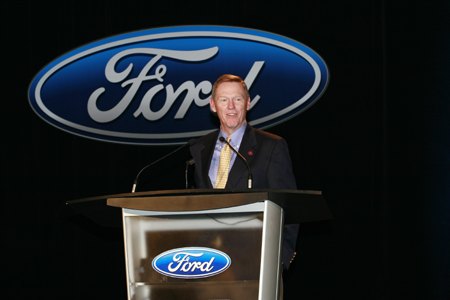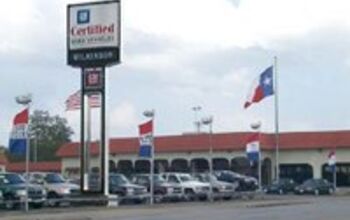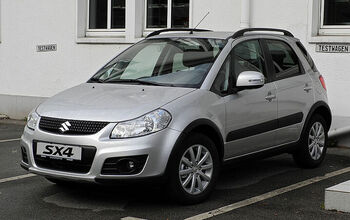Ford Death Watch 17: Dealer or No Dealer?
As bad as Ford’s third quarter results (version 1.0) were for Dearborn’s darlings, the future doesn’t look much better. Ford’s Chief Financial Officer Don Leclair has publicly admitted that he expects the automaker’s fourth quarter to look like the one that crushed the Arizona Cardinals in week six: a complete and utter disaster. What’s more, Leclair has also acknowledged that Ford’s production cuts crush any hopes of financial rebound for at least the first half of 2008– no matter how their cross-border crossover fares in the marketplace. So, is it time to panic?
Ford PR flack Becky Sanch certainly jangled a few nerves when she agreed with a Detroit Free Press analysis that estimates FoMoCo’s year end losses could snowball to a staggering $12.5b. (For those of you keeping score, that’s another $5.3b in the hole.) Market mavens blame about $1.6b on normal operating losses for the Christmas season. Ford also let slip that somewhere between $1.5b and $2.5b more in “special pretax items” would show up on ‘06’s financial statement. Bruce Clark, a senior VP with Moody’s Investors Service, figures FoMoCo’s cash cushion will lose some significant padding in the coming 12 months. The fact is Ford will continue to lose liquidity even after that.
Meanwhile, matching production to waning demand is job one. Ford’s across-the-board manufacturing cuts are designed to lead to 100% production efficiency (assuming Ford’s market share stabilizes at 13 to 14%). Short term, the reduced output should place less strain on Ford’s bloated dealer network, which is busy starving to death. Mike Jackson, CEO of AutoNation, points out that Ford's unsold inventory estimates include fleet sales. Jackson reckons Ford dealers are sitting on 105 days worth of unsold units– not the 75 that’s been reported. That’s a Hell of a lot of metal that needs moving.
While the production cuts will help dealers “catch-up” with falling demand, without a drastic reduction of the 4400 national Ford dealer network, improvements will be… fleeting. Rumor has it that Ford’s looking to fork-out $300k cash incentives to stores willing to cut their losses and die. Even if true, a mass exodus is hardly likely; $300k wouldn’t even cover most Ford dealers' Reynolds and Reynolds software contract. Several dealers indicate privately that it would take about $2m to $4m in further “special pre-tax” cash financing to get them to fold up their Ford tent and go home.
Analysts estimate that only 600 dealers can be bought out and closed down at the proposed rate. If so, Ford’s “new” market position means that the remaining Ford floggers will only move around 670 units each. That’s not what you’d call good news. To compete effectively with the vastly more efficient foreign-owned competition, to restore some of the lost luster to dealer profits, at least 1400 Ford dealerships need to get the axe. With just three thousand stores, each lot could conceivably push close to 1000 units out the door.
Again, it’s not likely that Ford will surrender the big bucks needed to make such a deep (and long overdue) cut to its dealer network. They may not have to. Given current estimates of about 616 units sold per dealer in ’06– “excess” dealerships may disappear through “natural attrition.” Without sufficient throughput, dealers lack the advertising dollars needed to lure the punters. And with less profit per unit to motivate sales staff, their ability to move the metal erodes. In increasing numbers, dealers are finding their margins bumping up against their overheads, until they take in less money than they spend and there’s no point carrying on.
While the dealer cancer spreads, freshly-minted Ford CEO Alan Mulally told the DTN that his employer needs to cut its costs: "It's all about competitiveness," he said. "You can't compete with a $3,400 disadvantage." Translation: Ford can’t afford its United Auto Workers (UAW) agreements. Mulally optimistically predicted that the UAW would see sense in their ’07 contract talks because A) it’s “Detroit’s defining moment” and B) if they don’t, by golly, he’ll take Ford’s case straight to the workers. Hi, I’m Alan. I made $35m this year and fly around in a Gulfstream. Here’s why you should work for less money, less benefits and a smaller pension.
If that wasn’t enough to rattle the bear cages on Wall Street, Mulally acknowledged that the Ford mothership faces a do-or-die cash crunch. "We have got to turn around North America and be profitable by 2009," Mulally said. "Because if not, you just keep losing cash and pretty soon you run out." Notice the change from “we” to “you.” It’s a classic example of disassociation; Mulally literally can’t face the possibility of a Ford bankruptcy. OK, now you can panic.
More by Neunelf
Latest Car Reviews
Read moreLatest Product Reviews
Read moreRecent Comments
- Flashindapan Beautiful color combinations. I assumed they stop selling the TT here at least five or six years ago.
- Carson D Just don't be the whistleblower who reports on the falsification of safety data. That's a deadly profession.
- Carson D I'd have responded sooner, but my computer locked up and I had to reboot it.
- Todd In Canada Mazda has a 3 year bumper to bumper & 5 year unlimited mileage drivetrain warranty. Mazdas are a DIY dream of high school auto mechanics 101 easy to work on reliable simplicity. IMO the Mazda is way better looking.
- Tane94 Blue Mini, love Minis because it's total custom ordering and the S has the BMW turbo engine.


































Comments
Join the conversation
But wouldn't it be worth it to Ford to offer dealers a more realistic buyout now so as to address the overflow network? Even if it cost Ford $5 to $6 billion dollars over three years, at least they'd be addressing the problem and setting the potential of future profitability. Dealer buyouts could be targeted to high concentration areas of dealer proliferation first.
The short answer is no.